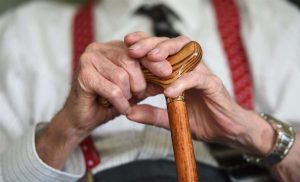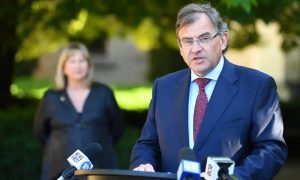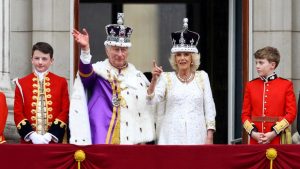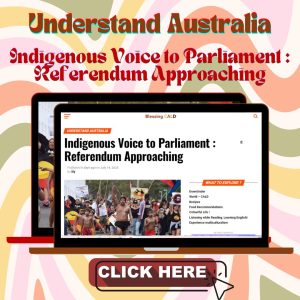Listening while Reading
The Dilemma of Elderly
Published
1 year agoon
By
lily
Australia, ranking as the world’s sixth-largest country by land area, is an economically developed nation that is currently facing the challenge of an aging population. The proportion of Australians aged 65+ is continuously increasing, placing a growing burden on the younger workforce.
In the past 70 years, the proportion of people aged 65+ has doubled, and according to the latest annual population report by the Department of the Treasury, this trend is expected to accelerate. The aging population is primarily due to increased life expectancy and declining birth rates. The large baby boomer generation has contributed to Australia’s aging population. The direct consequence of this trend is the challenge of retirement and elderly care.
The Inescapable “Power of Attorney”
The Australian Human Rights Commission has published a booklet titled “Your Rights At Retirement: A guide to making decisions and navigating you through your later life.”, to explain the rights of older Australians and provide early preparation for potential issues. After all, various services, support, and decisions in retirement can be complex—such as income assistance, healthcare and aged care, senior cards, financial planning, retirement funds, housing, and rent subsidies, just to name a few. One common issue many older people may encounter is the establishment of a “Power of Attorney.”
As one grows older, there may come a time when they believe that designating someone else to make decisions on their behalf is in their best interests. This is commonly known as establishing a “Power of Attorney,” particularly when individuals are affected by conditions that impair decision-making or when they anticipate a future loss of decision-making capacity. In most cases, individuals grant a “Power of Attorney” to a trusted family member or chosen lawyer, government public trustee, or a combination of these individuals. It is crucial to take steps to establish a Power of Attorney well before losing the capacity to make independent decisions. If a person loses decision-making capacity before establishing a Power of Attorney, the government will appoint someone to make decisions on their behalf.
The Power of Attorney is a convenient but often overlooked legal arrangement. Especially with an Enduring Power of Attorney (POA), which allows an appointed person to act on behalf of the individual when they are unable to attend or have unfortunately lost cognitive/behavioral capacity. For instance, patients with severe dementia can appoint an enduring attorney while they are still of sound mind, enabling the appointed person to handle all matters related to medical care and property if the elderly person’s condition deteriorates and they lose mental clarity. This is particularly important for new immigrants, as many elderly Chinese individuals assume that their children will naturally handle their affairs, without realizing that the Australian system requires formal documentation of power of attorney to allow the appointed person to make decisions or handle medical and financial matters on behalf of the individual.

/Public guardians violating individual wishes and forcibly keeping elderly dementia patients in nursing homes
The Prisoners of the Country
System designs are ultimately ideal visions of humanity, but once they enter real life, the scenarios become diverse and complex. Not everyone has the foresight or awareness, nor the resources, to proactively plan their retirement affairs in a clear and explicit manner. So what happens when their health deteriorates? A recent report by ABC has prompted a reconsideration of the practical application of the “power of attorney” system. It’s hard to believe that such a story unfolds in Australia, a country known for its freedom, giving the impression of living in a nation without democratic liberties, unable to assert any individual rights.
The protagonist of the story is a man in his 70s from Western Australia who was diagnosed with suspected dementia in 2021. He has been forcibly confined in a nursing facility for over 16 months, incurring an annual cost of over AUD 75,000, and the crucial part is that this decision was not based on his personal wishes. The man’s brother, who served as his appointed representative, exercised his authority and placed him in the nursing facility against his will, despite his desire to remain living independently at home, as suggested by his family doctor.
Once admitted to the nursing facility, his brother no longer wanted to assume the responsibilities of being the appointed representative, and the facility handed him over to the government-appointed public trustee. The elderly man requested access to his own medical and financial information, but these are managed by the public trustee due to his diagnosis of dementia. He was denied access to his own healthcare and financial information, all in the name of protecting him. Currently, this elderly man is primarily under the control of two West Australian government agencies: the public trustee and the public advocate’s office. During a hearing held in February last year, there were no reports from geriatricians or psychiatrists regarding his dementia, nor any formal capacity assessments. The only medical evidence came from the nursing facility’s affiliated general practitioner, which led to the court’s final determination that the elderly man was “incapable of making reasonable judgments” and “unable to care for his own health and safety”. The Administrative Appeals Tribunal also confirmed that the court does not require expert evidence and that reports from general practitioners are often used as evidence. This raises doubts as to whether relying on evidence from the nursing facility poses a conflict of interest.
The plight of this elderly man is not an isolated case; it is happening to thousands of Australians. According to the law, if a person is deemed incapable of self-care and lacks family or friends to provide care, they will be assigned a public trustee and a public advocate. In Australia, every state and territory, except for the Australian Capital Territory, has similar laws, and it is estimated that 50,000 Australians with brain injuries, dementia, mental illness, or intellectual disabilities live under such orders. The public trustees manage over AUD 13 billion in assets belonging to these individuals, extracting millions of dollars in fees from their accounts annually, but due to privacy requirements, all of this is done behind a veil of secrecy.
Many people point out that while state governments establish public trustees, they do not provide funding, instead directly extracting fees from the assets of those under protection. This allows public trustees to view individuals with significant assets as cash cows, rather than acting impartially to protect them. It seems that in the case of this elderly individual, his substantial assets have become a means for the public trustee to violate his wishes and “imprison” him in a nursing facility.
Reform Cannot Be Delayed
Old age dementia, medically known as Alzheimer’s disease, requires guardianship and financial management for patients who have lost self-awareness. Although the medical field has devoted significant resources to research on treating dementia, there have not been significant breakthroughs so far. The period from September 1st to September 30th is Dementia Awareness Month, and it is important to recognize that old age dementia is not a normal part of aging. However, the Alzheimer’s Australia organization predicts that Australia will have approximately one million dementia patients by the middle of this century. The issue of caring for this population cannot be ignored.
Although individuals with dementia experience impacts on their memory, thinking, and daily functioning, it does not mean that their human rights should be violated. In other words, individuals with dementia should not be subjected to insults, discrimination, harm, or neglect. This raises the question of who determines the “best interests” of these elderly individuals and what role their own wishes play in the decision-making process. Over time, the condition of dementia patients deteriorates, but each case is unique. For patients in the early stages of the disease, whether it is in line with human rights to deprive them of the right to make decisions regarding their own affairs warrants discussion. Moreover, when it comes to a person’s well-being, a simple medical certificate may not be sufficient to legally determine their loss of cognitive capacity. Court assessments of whether someone is capable of making decisions regarding their health and finances or whether they require assistance need not only more evidence but also consideration of personal circumstances.
The current system of public trusteeship has been heavily criticized for its lack of accountability, high fees, and higher fees charged to those with assets. They have control over significant financial matters with minimal scrutiny, which undoubtedly constitutes a major intrusion into individuals’ lives, for which the government must assume its corresponding responsibility. Furthermore, as Australia is an immigrant society, older immigrants from diverse cultural backgrounds face additional challenges due to language, culture, and traditions. In recent years, with the release of the Royal Commission into Aged Care Quality and Safety final report, the call for significant reforms in Australia’s aged care industry has been growing. Fundamental reforms are urgently needed, whether in the aged care system itself or in its operations, funding support, and regulatory methods.
The Dilemma of Chinese Elderly
The Chinese community has limited and long-term understanding of the rights of the elderly, mainly due to the fact that most Chinese immigrants arrived in Australia in the late 1980s. Before the 1990s, Chinese immigrants were mostly in their thirties or forties, and there were not many elderly individuals at that time. The most well-known organizations that many people participate in, such as the The Chinese Senior Citizens Club of Manningham and the Box Hill Senior Citizens Club, celebrated their 35th anniversary last year, indicating that there were more 60+ aged Chinese seniors settling in Melbourne around 1987. Many times, they live with their children, and their lives are taken care of by the next generation.
However, the influx of Hong Kong immigrants in the 1990s and the trend of Chinese students immigrating after 2000, coupled with China’s one-child policy, led to the phenomenon of parents of international students becoming de facto retired immigrants. Suddenly, the number of Chinese seniors over the age of 60 increased significantly. Today, these seniors are in their 80s, and whether it is their care or issues related to illness, personal care, and their rights, it is evident that the Chinese community is ill-prepared.
Although the children of these seniors have received education in Australia, they may not be familiar with the Australian social system due to their relatively short time living in the country. When their parents encounter problems in managing their lives, they may not be able to assist them in finding solutions. If there are strained relationships with their children, if they do not live with their parents, or if they do not meet frequently, these seniors are easily left without assistance in their daily lives, and may not be able to find the best arrangements for themselves.
From Social Life to Care and Rights
Yes, indeed, for the past 35 years, the Chinese community has established numerous senior associations that have taken care of the social lives of elderly individuals. We have witnessed many seniors leading vibrant and colorful lives. Those who enjoy socializing have senior clubs, various educational classes, volunteer participation, performance groups, or church groups. However, as these seniors begin to experience physical decline, they require more care facilities and greater support in their daily lives. All of these aspects involve senior rights and personal life management.
Knowledge in this area is not widely introduced within the immigrant community, so most seniors are unaware and uninformed. Even mainstream society recognizes that senior rights are not adequately protected. It is time for us to pay more attention to the rights of our seniors and ensure that they can enjoy a safe and happy life in their later years after immigrating to Australia.
You may like
Listening while Reading
Necessity of University Reform in Australia
Published
1 year agoon
July 10, 2023By
lilyFor a long time, Australia has been described as the “Country of Luck” and the “Land of Opportunity”, promising “a better life for every generation.” However, this narrative is gradually fading away from the speeches of Australian politicians.

More and more young people are realizing that this promise cannot withstand the test of time, and they find it difficult to benefit from it. Particularly with the increasing annual university tuition fees, the pressure on Australian youth to pursue higher education is growing. Recently, Duncan Maskell, the Vice-Chancellor of the University of Melbourne, joined forces with the Greens Party and student association to advocate for free higher education, which triggered a lively discussion.

/ Vice-Chancellor of the University of Melbourne called for free university education
Missed Benefits
In the 1950s, the Commonwealth of Nations initiated the Colombo Plan, aiming to cultivate professionals in underdeveloped countries in the Asia-Pacific region through international cooperation in the form of financial and technical assistance, education, and training programs. It was one of the world’s pioneering aid programs. Under this plan, a large number of Asian countries, including Hong Kong, sent students to study in Australia, and at that time, these students did not have to bear the burden of tuition fees. In 1974, the Australian Federal Government, led by Prime Minister Gough Whitlam, announced the implementation of free higher education policy and introduced the Higher Education Contribution Scheme (HECS), which eliminated economic barriers for children from low-income families, greatly promoting educational equity. President Maskell himself attested to being a beneficiary of free university education, as coming from a working-class background, it would have been highly likely for him to be unable to attend university if he had been required to take out a loan.
In 1979, the Australian government implemented a fee plan for international students, and starting from January 1986, full tuition fees were charged to overseas students. At that time, Australia’s study abroad industry officially transitioned from an aid program to a profit-generating industry. However, due to the affordable tuition fees at the time and the government’s welcoming attitude towards internationally educated students for immigration, it sparked an early wave of self-funded study abroad in Australia. It was also during that era that the number of international students in Australia began to rapidly increase. As for domestic students, in 1998, Prime Minister John Howard introduced the Youth Allowance, providing financial support to young people for studying and seeking employment. The allowance simplified the assistance process and reduced the financial pressure on young people. This system was popular at the time. By 2003, over one-third of university students in the country had received the Youth Allowance. However, the increase in the allowance was very low and did not keep up with the rising costs of tuition and living expenses.
In summary, the Australian government previously provided relatively lenient policies, allowing Australian residents to enjoy lower university tuition fees. However, over time, the policies have become increasingly restrictive, and the benefits enjoyed by Australian residents have diminished. Currently, the government has tightened the funding subsidy requirements for universities, and tuition fees for most universities are continuously rising. In this situation, the cost of university education for Australian residents has also increased significantly compared to the past. Additionally, many Australian universities have reduced the tuition fees for international students in order to attract more international and study abroad students, resulting in a significant proportion of international students occupying university enrollment quotas. In this situation, Australian residents need to compete with more study abroad students, which further increases their burden in pursuing higher education.
Why studying at University?
Education, especially higher education, is one of the pathways for us to acquire knowledge, skills, and abilities for career success and independence. Fair distribution of education contributes to creating an inclusive and equitable society. After a period of offering free university education in Australia in the last century, the introduction of university fees and HECS student loans in the late 1980s did not address the issue of enabling more students from disadvantaged and underprivileged backgrounds to access university education. The current Australian Minister for Education, Jason Clare, has explicitly stated that one of the main goals in the current review of higher education is to address the issue of underrepresentation of students from disadvantaged backgrounds in degree attainment.
The primary purpose of university is to produce qualified graduates who can contribute to valuable work in society. However, the job market in Australia has become highly competitive, with businesses increasingly preferring experienced employees. This poses a significant challenge for new graduates. In this context, Australian residents need higher qualifications to enhance their employment opportunities, which also increases the burden of attending university. In addition to tuition fees, Australian residents have to bear accommodation costs, food expenses, textbook expenses, and other daily expenses, all of which contribute to a greater financial burden. However, if we can take a long-term perspective and view the higher education industry not only as a revenue-generating sector but also as a long-term investment in cultivating talent for the future, we would have a different understanding.
Australia is a high-tax country. Even if someone earns a pre-tax income of 100,000 AUD, they may end up with only 70,000 AUD after taxes. The more you earn, the more taxes you pay. Therefore, for graduates burdened with high student loans, even if they choose a high-paying job, their disposable income after tax and repayment is significantly reduced. It may be more advantageous to opt for a vocational education program with lower or even no fees, without the enormous pressure of repayment after entering the workforce. Once the government implements free university education, students can freely choose the subjects they are interested in without being deterred by the prospect of significant future debt. In the short term, the government would need to increase investment and reallocate fiscal expenditures. However, in the long run, the positive impact of having a larger number of university-educated individuals in the country on future income is likely to outweigh the costs, as human capital is often priceless.
Reform is Imperative
Making undergraduate education free once again may sound like a radical idea, but it is not a radical concept globally, and Australia has fallen far behind many other countries. An analysis conducted by the Organisation for Economic Co-operation and Development (OECD) last year revealed that the average annual cost for Australian university students is around 5,000 USD, while in France, Belgium, and Germany, the annual average cost is less than 250 USD. Countries like Denmark, Finland, Norway, Sweden, Chile, Poland, Latvia, Estonia, and Turkey offer free education to their residents. Even Australia’s neighbor, New Zealand, offers free education for the first year. It is evident that the tuition pressure faced by Australian students places them in the “first tier” among developed countries. Considering the inflation factor, it’s no wonder that the National Union of Students is advocating for the implementation of free education.
Of course, attending university is not the choice for all Australian residents. Some professions do not require higher degrees but practical experience and skills. Therefore, for these Australian residents, whether university education is free or not is not crucial to their livelihoods. The Australian government has gradually realized this issue and is beginning to allocate more funds and resources to vocational skills training to meet the demands of the future job market. This year, Australia will offer 180,000 free spots for Technical and Further Education (TAFE). These free courses are part of a joint effort by state and federal governments, with priority areas including nursing, technical fields, hospitality, and construction. However, vocational education is different from higher education. The education level of the population is an important aspect in measuring a country’s human capital stock, as well as a significant indicator of social development and civilization. Investing in human capital through education and technological advancement is an inevitable path for any responsible government.
Data shows that in the fiscal year 2018-19, Australia’s expenditure on university education accounted for only 0.65% of GDP, a figure significantly lower than the OECD average expenditure of 0.9% among 38 countries. The past three years, marked by the COVID-19 pandemic, have had a tremendous impact on Australian universities. Since the moment Australian universities closed their borders to international students in 2020, they have faced the biggest crisis in their history. Higher education funding is severely lacking, with the industry heavily reliant on revenue generated by international students. This is undoubtedly unsustainable. Today, with the rapid rise in living costs, the increased cost of university education may mean that more and more Australians are unable to obtain a university degree due to exorbitant tuition fees. Recent government estimates indicate that by 2025, 52% of jobs will require a degree. The worst-case scenario is that the cost of obtaining a degree becomes a barrier to acquiring one, further widening the wealth gap in society. If the government wants to prevent this scenario from unfolding, it must take effective measures now to curb the worsening situation.
Changes of the social positioning of University education
University reform needs to start from the social positioning of university education, which clearly requires social consensus. Therefore, political parties need to present a set of appropriate views for today’s society. The recent provision of free 3-year-old preschool education by the Victoria State Government, aimed at assisting dual-income families, has received social recognition because the high cost of early childhood education significantly reduces the willingness of low-income female workers to work. Similarly, when introducing university fees, society expects higher income returns from university graduates, which seems to lack persuasiveness in today’s Australia.
Due to the relatively low initial incomes of university graduates in the first few years after graduation, the debt owed to the government for attending university cannot be repaid within those initial years. For women, entering the stage of marriage and child-rearing is already a setback to their career development. By the time their children grow up and they return to work, many of them lack competitiveness. Meanwhile, their government student debt continues to increase due to inflation, making them unable to feel the advantages brought by university education. In addition, with the advancement of technology and society, many people have to pursue another degree around 10 years after graduation to maintain their advantage in the workforce or change their career development. In other words, they have to invest again to increase their value. Many people have begun to understand that studying at a university is a continuous investment rather than a personal asset.
When society changes its expectations for university education, the willingness of individuals to make such investments will be considered based on real benefits. If the government fails to keep up with the changing social attitudes, university education will become a high-input, low-output endeavor, resulting in a majority unwilling to invest or many individuals obtaining government loans for education without intending to repay the debt. In the end, there will be a large number of bad debts in university loans, with the government bearing the losses.
Today, this has become a problem in the system. A significant portion of university loans is believed to be unrecoverable. If this continues, Australia’s university education system will fall into chaos and inefficiency. It is believed that now is the time for society to undertake reforms.
The coronation ceremony of King Charles III of the United Kingdom took place at Westminster Abbey in London on May 6th.

On December 25, 1066, “William the Conqueror” became the first English king to be crowned at Westminster Abbey. Charles III became the 40th king to be crowned there. The last coronation held at Westminster Abbey was that of Charles’ mother, Queen Elizabeth II, in 1953 when Charles was only 4 years old. This is the grandest ceremony in the UK in 70 years and an international event that has garnered global attention.
Among our readers, even those from Hong Kong and Malaysia, former British colonies, who are under the age of 70, have never witnessed such a spectacle. The coronation ceremony held this time attracted a global audience of 300 million people, and it can be said that it broadened our horizons. Chinese readers understand that the last emperor of China, Yuan Shikai, ended in humiliation, with his coronation ceremony being conducted amidst insults, making it difficult to comprehend the significance of ascending to the throne.
The coronation of Charles III has garnered global attention and, at the same time, allowed us to observe and understand the responsibilities and roles that kings assume in Western Christian societies.

/The Crown of Saint Edward

/Coronation of the King and Queen of the United Kingdom
Ubiquitous Religious Significance
The Coronation Ceremony was officiated by the current Archbishop of Canterbury, Justin Welby. Witnessed by approximately 100 global leaders and a televised audience of three billion, the ceremony involved religious and moral symbolisms such as oaths, anointing, and authorization. Archbishop Welby placed the 360-year-old St. Edward’s Crown on the head of King Charles III, noting the thorn-shaped decorations on the crown symbolizing the suffering Christ and sacrifice, while proclaiming loudly, “God save the King.” With this, Charles III was formally crowned as the monarch, carrying on the traditions and history of the British monarchy, which spans over a thousand years.
A common thread throughout the Coronation ceremony was the emphasis and request from the Archbishop for the King to commit to serving the people, rather than the people unconditionally pledging loyalty and obedience. The new King swore an oath to God that he was here to serve the people and not the other way around. Each stage of the Coronation ceremony showcased the representation of the Church crowning the King, with God being the “King of Kings,” and the King serving as the link between God and the people. The King’s duty is to uphold justice and unite the nation, with these fundamental principles forming the legitimacy of the moral authority of the British monarchy. The ceremony even involved the King wearing a warm glove, symbolizing the caution, gentleness, and legality in exercising power.
The primary regalia received by the monarch is a golden orb with a precious cross, symbolizing the role of the British monarch in protecting the Christian faith and the Christian world. The King also receives two golden scepters: the first one topped with a dove, symbolizing the Holy Spirit and signifying that the King’s power is blessed by God and must be exercised according to His laws. The Dove Scepter represents spiritual authority and is also known as the “Scepter of Justice and Mercy.” The other scepter, known as the ruling scepter, bears a cross, symbolizing secular power and its connection to Christianity. Since 1661, all three regalia items, along with the St. Edward’s Crown, have been used in the coronation ceremonies of every British monarch.
In 597 AD, Pope Gregory the Great dispatched missionaries to the Kingdom of Kent, marking the gradual Christianization of England. The Church needed the protection of the monarchy to gain more followers, and the monarchy required religion to bestow a divine aspect upon its rule. From then on, the Church and the monarchy became inseparable, displaying a relationship of the fusion of politics and religion. In 1215, under pressure from the nobility, King John of England signed the Magna Carta, limiting the powers of the monarchy and evolving into the parliamentary system we see today, where governance is entrusted to representatives elected by the people, laying the foundation for democratic society.
It is rarely considered that the British monarchy exercises a constitutional monarchy, with the country being governed by a democratically elected Prime Minister, effectively stripping the monarch of practical governing powers, yet preserving the institution to this day. During the French Revolution, the Emperor of France was overthrown by the people, resulting in the entire monarchy disappearing from France. Many European countries faced similar situations after the 17th century, where people demanded the power to govern their nations democratically. Those who voluntarily relinquished power and returned it to the people, like the monarchies of the Netherlands, Spain, Sweden, and a few others, have managed to retain their position in European society. What lessons can be learned from history for China, which maintains an authoritarian regime with power centralized in a single party? One wonders if China’s leaders will take inspiration from the Coronation Ceremony of King Charles III and recognize that in today’s society, governance power.
The Integration of Tradition and Modernity
The coronation ceremony is fundamentally a religious ritual, where Charles III swears to defend the Church of England and ensure that all monarchs, including himself, will always be Protestant. However, unlike tradition, religious leaders from other faiths, including Hinduism, Islam, Sikhism, and Judaism, played important roles in the ceremony, representing the diversity of modern, multicultural Britain and the Commonwealth. Charles III added a preface to his coronation oath, stating that the Church of England “will seek to create an environment in which all faiths and those of no faith can live freely”.
Non-Christian leaders presented the coronation regalia with less overt religious attributes to the king before the formal crowning, and female clergy members took on more significant roles. This seems to cater to the contemporary British appetite for “equality” and “inclusivity”. The public, for the first time, was invited to participate in the Million Voices chorus, replacing the traditional allegiance oath of the nobility and hereditary peers kneeling before the monarch in the church—now the public expressed their allegiance to the king. Charles III’s coronation ceremony is filled with history and tradition while also demonstrating that the British royal family wishes to present a forward-looking monarchy and monarch.
The late Queen Elizabeth’s coronation ceremony in 1953 lasted over three hours, featuring a grand procession from Westminster Abbey through London back to Buckingham Palace, covering a total distance of about 8 kilometers. In contrast, Charles’s coronation ceremony lasted only about one hour, with a procession route of approximately 2.1 kilometers, conveying his vision of a “streamlined modern monarchy”. Although the total cost was more than three times higher than that of his mother’s coronation, the intention to use this coronation to consolidate the royal image was almost an open secret. At the age of 73, Charles became the heir to the throne in 1953 when his mother, Queen Elizabeth II, ascended. He is currently the longest-serving heir in British history.
During his 70-year-long period as heir, Charles III witnessed the succession of leaders around the world, including 15 British Prime Ministers and 14 U.S. Presidents, making him the most prepared and oldest new British monarch. While some British media outlets question the status and role of monarchy, the mainstream media seems to have a more positive view of Charles’s performance in the coronation ceremony, emphasizing the importance of the monarchy in British politics and cultural life. Additionally, the hundreds of thousands of British citizens who braved the rain to witness the ceremony provided powerful support, undoubtedly boosting the morale of the British royal family.
The Road to Republic in Commonwealth Countries
On May 6th, over 2,000 guests, including members of the royal family, religious leaders, and heads of state, witnessed the historic moment of Charles III’s coronation at Westminster Abbey. Among them was Prime Minister of Australia Albanese, who pledged allegiance during the coronation ceremony and extended an invitation to Charles III to visit Australia as the king. Although opposition leader Dutton did not attend the coronation, he publicly stated that the coronation was an important moment for the British people, Australians, and all Commonwealth citizens, as it reestablished the connection with history and symbolized the rebirth of the current era. Dutton also emphasized that the king respects the right of all Commonwealth people to decide their own destiny, including the choice to become a republic.
While the coronation ceremony has concluded, it has reignited debates about slavery, the legacy of colonialism, and republicanism. As this monarch ascends to the throne, some Commonwealth countries are considering independence and reexamining the issues left by British colonialism. They are also pushing for compensation from governments and institutions for the damage and suffering caused by the transatlantic slave trade. Today, Charles III represents a nearly 1,000-year-old unbroken royal lineage: he now stands on an unstable fault line, with romanticized British history on one side and a group of frank former colonies demanding he confront the harsh realities of British imperial history. The era of warm handshakes and smiles between the British royal family and its distant realms has come to an end.
For a long time, Australia has been debating whether to retain a constitutional monarchy. The 1999 nationwide referendum on becoming a republic ended with 55% of voters opposing the move. It is evident that there is significant divergence among the Australian public on this issue. Supporters of retaining the constitutional monarchy argue that the constitution is more important than the monarchy itself. Australia has never faced a constitutional crisis, and the constitution has always protected democracy remarkably well. On the other hand, proponents of a republican system believe that Australia’s sovereignty should not be in the hands of a foreign monarch but represented by the Prime Minister of the country. Stan Grant, an ABC News anchor of Indigenous heritage, criticized on the program “Q+A” that the monarchy does not reign supreme in the eyes of the people. The crown symbolizes invasion and the plunder of land, especially for Indigenous people, representing the impending bicentenary of an aggressive war.
The British royal family has always sought to act as a politically above and neutral head of state. The challenges faced by Charles III will not only involve engaging with emerging social issues but also winning the support of the younger generation. It is evident that the popularity of the royal family has declined among today’s young Australians. Additionally, the government announced earlier this year that the portrait of the British monarch will be removed from the $5 banknote in favor of designs featuring indigenous elements, rather than featuring King Charles. The presence of British royals on the currency can be traced back to the era of the Australian pound, but Queen Elizabeth II’s passing last year prompted calls from republic supporters to remove the face of the British monarch from the $5 banknote. The path to a republic will not happen overnight but will be achieved gradually through incremental changes.
Listening while Reading
At one year of the Russia-Ukraine war
Published
1 year agoon
July 10, 2023By
lily
On the day before the anniversary of Russia’s invasion of Ukraine, the US President Biden made a five-hour visit to Kiev under the threat of missiles. This sudden but high-profile visit has shed some light on the upcoming direction of this war.
After the deep winter Russia has obviously geared up heavier armament amid a deadlock of the war. Some European countries’ aid to Ukraine have become hesitant. Wang Yi, China’s Director of the Office of the Central Foreign Affairs Commission, indicated at the Munich Security Conference that Chairman Xi Jinping was about to speak on the way forward in seeking a peaceful option on the war through political dialogue.
But with a 80-year-old Biden traveling miles over including a 10-hour train ride from Poland to the city of Kiev under fire certainly has boosted the Ukrainians a lot with US’s strong support on their determination to fight on. This is a clear signal of the uncertain situation and has offered much help to President Zelenskyy being bothered by his corruption saga.
This war by now is no longer a fight between these two countries. It is a time since WWII for the world to work out a system to resolve military conflicts between a big and small nation. Russia’s opponent is not Ukraine but the European developed countries under threat joining up for self-defense and the US as the superpower trying hard to keep her control in the world order.
In this war, Australia for sure has taken sides with the western allies. But Australia should also be on high alert with a strategic position under the influence of China.
We should have a clearer picture of the development over the coming weeks, by then the upper hand would unfold in the battle ground and the political tug-of-war between the great nations would show outcome.
Yes the world is full of uncertainties, and people are worrying. This could be an opportune for us to reflect on how our religion could offer us peace whilst in turmoil.
What to explore ?

Where do Chinese Australians go from here?

Sydney Church Attacks: A Warning

The Internet Micro-Short Drama is Hard to Say

Identity of Chinese Australians

From the Mystery of “Sheikh of Dubai

Fraudulent ivermectin studies open up new battleground

Cantonese Mango Sago

NEMBC Arabic COVID 19 News – 14 June 2022

保护您自己和家人 – 咳嗽和打喷嚏时请捂住

FILIPINO: Kung nakakaranas ka ng mga sumusunod na sintomas, mangyaring subukan.
Trending
-

 COVID-19 Around the World3 years ago
COVID-19 Around the World3 years agoFraudulent ivermectin studies open up new battleground
-

 Cuisine Explorer4 years ago
Cuisine Explorer4 years agoCantonese Mango Sago
-

 Arabic2 years ago
Arabic2 years agoNEMBC Arabic COVID 19 News – 14 June 2022
-

 Cantonese - Traditional Chinese4 years ago
Cantonese - Traditional Chinese4 years ago保护您自己和家人 – 咳嗽和打喷嚏时请捂住
-

 Tagalog4 years ago
Tagalog4 years agoFILIPINO: Kung nakakaranas ka ng mga sumusunod na sintomas, mangyaring subukan.
-

 Uncategorized4 years ago
Uncategorized4 years ago如果您出現以下症狀,請接受檢測。
-
Uncategorized4 years ago
在最近的 COVID-19 應對行動中, 維多利亞州並非孤單
-

 Uncategorized4 years ago
Uncategorized4 years agoCOVID-19 檢驗快速 安全又簡單



